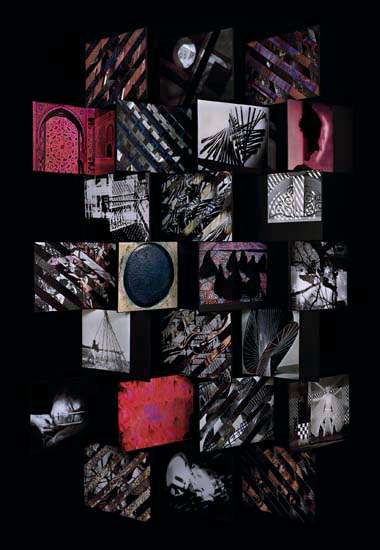
Sara VanDerBeek, The Principle of Superimposition 2, 2008. Chromogenic color print, 64 9/16 × 44 1/2 inches (164 × 113 cm). Gift of Anthony Terrana. Courtesy the artist, Metro Pictures, New York, and Altman Siegel, San Francisco. © Sara VanDerBeek
Fascinated by the relationship between sculpture and photography, Sara VanDerBeek constructs assemblages of objects and images that she then photographs to produce the final work. To locate the materials and images she uses for these fusions of photography and sculpture she searches a variety of sources—art history books, her family photographs, and ephemera she has collected. She shoots numerous rolls of film of each tableau before selecting one.
The sculpture at the center of The Principle of Superimposition 2 is a freestanding screen structure comprised of twenty-four image panels set against a seamless black background. The structure is inspired by a folding screen designed by architect Eileen Gray. The images making up the panels range from photograms found in László Moholy Nagy’s book Vision in Motion (1947) to an Erwin Blumenfield fashion photograph and a picture of women dressed in black burkas and posed on a patterned carpet featured in a Time/Life photography book. For several of the panels, VanDerBeek splices two images together diagonally, “like a filmic cross-fade made concrete,” as the artist has said. In one panel, the geometric patterns of a fifteenth-century Chinese ceramic vessel interpenetrate with a Leni Riefenstahl photograph of a Kau man painting.
This photograph adds depth to the ICA/Boston’s holdings of VanDerBeek’s work, and further strengthens the collection of studio-based photography, which includes works by Roe Ethridge, Pipilotti Rist, Thomas Ruff, and Lorna Simpson.
2017.28